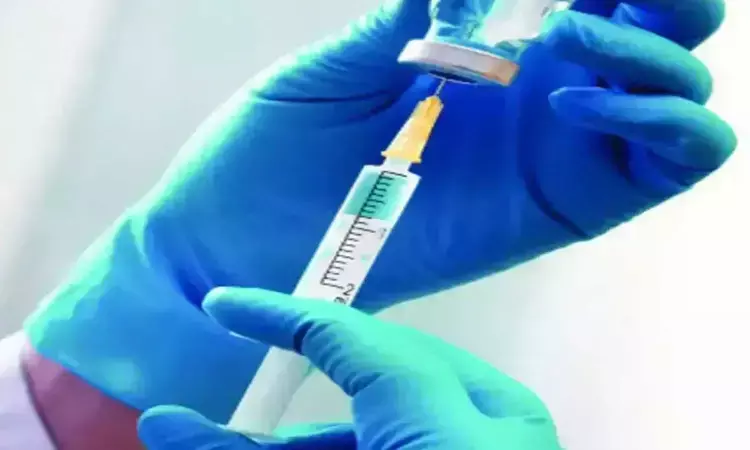- Home
- Medical news & Guidelines
- Anesthesiology
- Cardiology and CTVS
- Critical Care
- Dentistry
- Dermatology
- Diabetes and Endocrinology
- ENT
- Gastroenterology
- Medicine
- Nephrology
- Neurology
- Obstretics-Gynaecology
- Oncology
- Ophthalmology
- Orthopaedics
- Pediatrics-Neonatology
- Psychiatry
- Pulmonology
- Radiology
- Surgery
- Urology
- Laboratory Medicine
- Diet
- Nursing
- Paramedical
- Physiotherapy
- Health news
- Fact Check
- Bone Health Fact Check
- Brain Health Fact Check
- Cancer Related Fact Check
- Child Care Fact Check
- Dental and oral health fact check
- Diabetes and metabolic health fact check
- Diet and Nutrition Fact Check
- Eye and ENT Care Fact Check
- Fitness fact check
- Gut health fact check
- Heart health fact check
- Kidney health fact check
- Medical education fact check
- Men's health fact check
- Respiratory fact check
- Skin and hair care fact check
- Vaccine and Immunization fact check
- Women's health fact check
- AYUSH
- State News
- Andaman and Nicobar Islands
- Andhra Pradesh
- Arunachal Pradesh
- Assam
- Bihar
- Chandigarh
- Chattisgarh
- Dadra and Nagar Haveli
- Daman and Diu
- Delhi
- Goa
- Gujarat
- Haryana
- Himachal Pradesh
- Jammu & Kashmir
- Jharkhand
- Karnataka
- Kerala
- Ladakh
- Lakshadweep
- Madhya Pradesh
- Maharashtra
- Manipur
- Meghalaya
- Mizoram
- Nagaland
- Odisha
- Puducherry
- Punjab
- Rajasthan
- Sikkim
- Tamil Nadu
- Telangana
- Tripura
- Uttar Pradesh
- Uttrakhand
- West Bengal
- Medical Education
- Industry
Leflunomide Effective in Fighting Obesity by inducing lipophagy: Study

A recent study published in the FASEB Journal has uncovered a new pathway to combat obesity. Leflunomide, a medication typically used to treat rheumatoid arthritis, has shown unexpected potential in aiding weight loss and reducing blood glucose levels in patients.
Recent studies have shed light on the mystery, revealing that the active metabolite of leflunomide, known as A77 1726, plays a key role in activating a process called lipophagy. Lipophagy is a specific form of selective autophagy responsible for breaking down lipid droplets, and it is closely linked to obesity.
A77 1726 was found to induce LC3 lipidation, prompting an increase in autophagosomes and lipoautolysosomes, effectively leading to the breakdown of lipid droplets in adipocytes (fat cells). This process was activated through a complex signaling cascade involving TGF-β-activated kinase 1 (TAK1), AMP-activated kinase (AMPK), and Unc-51 like autophagy-activated kinase 1 (ULK1).
Notably, A77 1726 reduced the lipid content in fat cells, confirming its role in combating obesity at a cellular level. This effect was further validated when A77 1726-treated mice, particularly those with genetic obesity (ob/ob mice), experienced restricted weight gain, decreased visceral fat deposits, and smaller adipocytes.
Moreover, leflunomide treatment induced autophagy not only in adipose tissue but also in the liver, leading to reduced hepatic lipid content. This suggests that leflunomide's anti-obesity properties extend beyond fat cells.
The research also revealed a link to the protein S6K1, previously associated with insulin resistance. A deficiency in S6K1 was found to increase levels of LC3 lipidation in various tissues, reinforcing the connection between this protein and obesity.
These findings open exciting new avenues for the treatment and understanding of obesity, a global health epidemic. Leflunomide's ability to activate AMPK and induce lipophagy provides fresh insights into its anti-obesity mechanisms.
Source:
Ji, X., Chen, J., You, C., Sun, J., & Xu, X. (2023). Leflunomide alleviates obesity via activation of the TAK1‐AMPK pathway and induction of lipophagy. In The FASEB Journal (Vol. 37, Issue 11). Wiley. https://doi.org/10.1096/fj.202301162r
Neuroscience Masters graduate
Jacinthlyn Sylvia, a Neuroscience Master's graduate from Chennai has worked extensively in deciphering the neurobiology of cognition and motor control in aging. She also has spread-out exposure to Neurosurgery from her Bachelor’s. She is currently involved in active Neuro-Oncology research. She is an upcoming neuroscientist with a fiery passion for writing. Her news cover at Medical Dialogues feature recent discoveries and updates from the healthcare and biomedical research fields. She can be reached at editorial@medicaldialogues.in
Dr Kamal Kant Kohli-MBBS, DTCD- a chest specialist with more than 30 years of practice and a flair for writing clinical articles, Dr Kamal Kant Kohli joined Medical Dialogues as a Chief Editor of Medical News. Besides writing articles, as an editor, he proofreads and verifies all the medical content published on Medical Dialogues including those coming from journals, studies,medical conferences,guidelines etc. Email: drkohli@medicaldialogues.in. Contact no. 011-43720751


